
Smith-McCorkle Home
4910 Navahoe Street Leonard Smith and Mamie McCorkle Parcel 20 Block 4 Block 16 lot 2

4910 Navahoe Street Leonard Smith and Mamie McCorkle Parcel 20 Block 4 Block 16 lot 2
Section D: Project Proposals. Statement of Special Conditions.

Building the new home of Harold and Julia Pitts in the Central, Conservation area. They had lived in the western section of Lakeland

Front on Baltimore Avenue

Bessie Mack, John Chesley Mack Jr.,Julie E. Carroll 5030 Navahoe St. After fire Parcel 1-1 Front and rear of building

4800 Navahoe Street - First Lakeland home demolished shown with bulldozer and rubble.
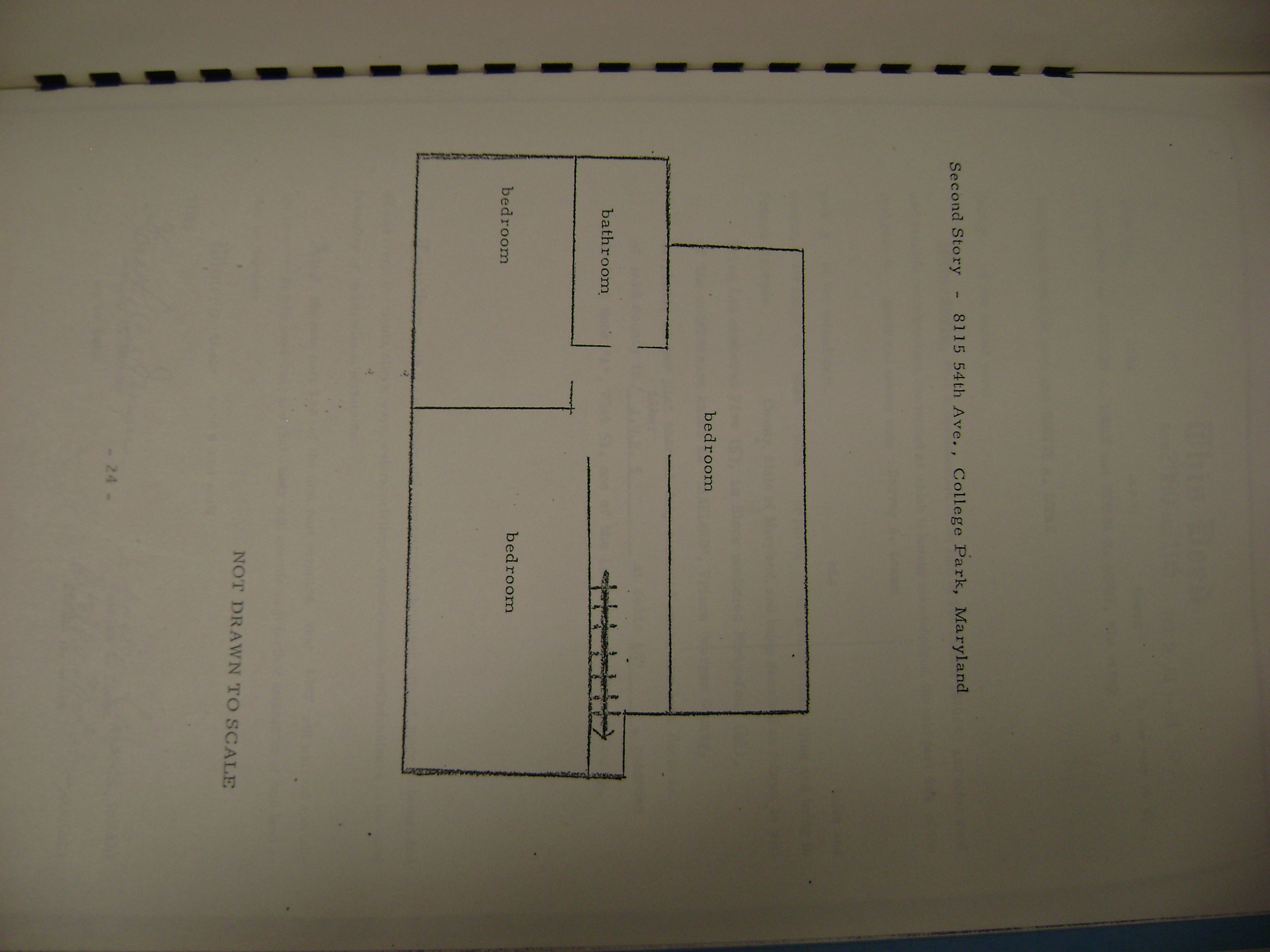
8115 54th Ave Lomax Home

Rear and side views 5030 Navahoe Street Property owned by Bessie Mack, John Chesley Mack, Jr & Julia E. Carroll. After the fire in the building.

4906 Navahoe St Project Parcel 20-6
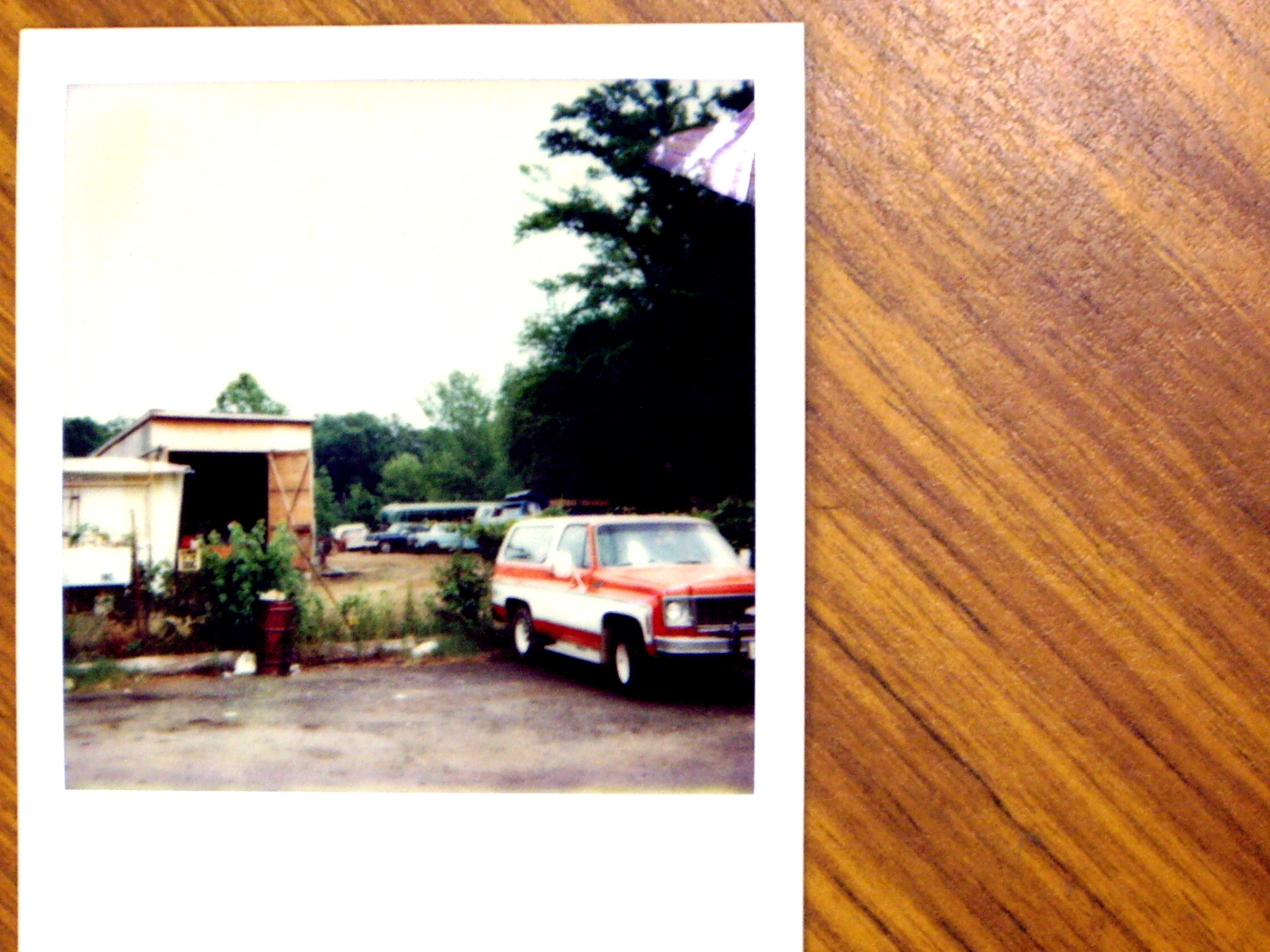
Weygandt property
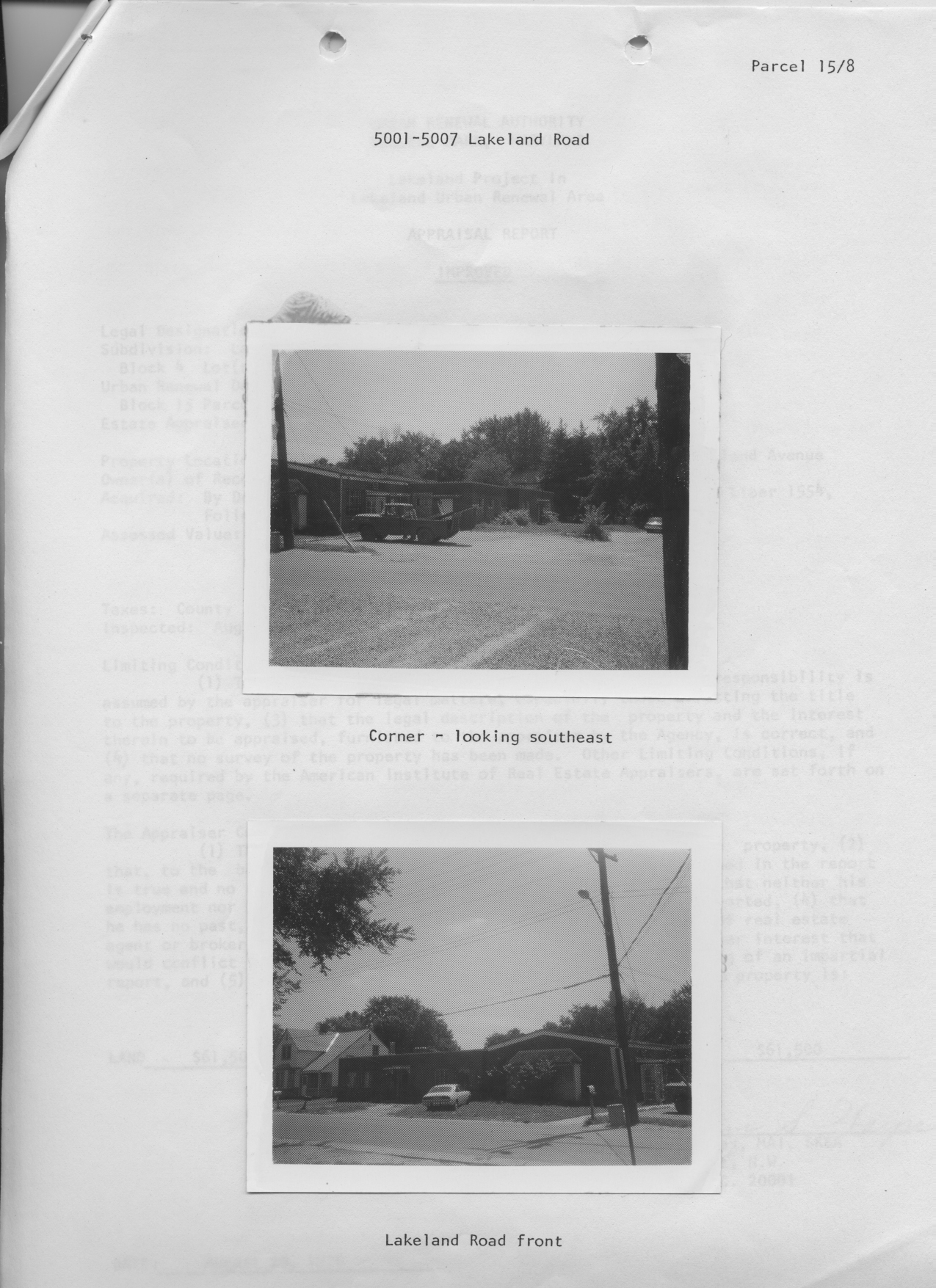
Located on the corner of Lakeland Road and Rhode Island Avenue. It was a neighbored store with lunch counter and a jukebox. The building included apartment units and at times a dry cleaners and hair stylist.
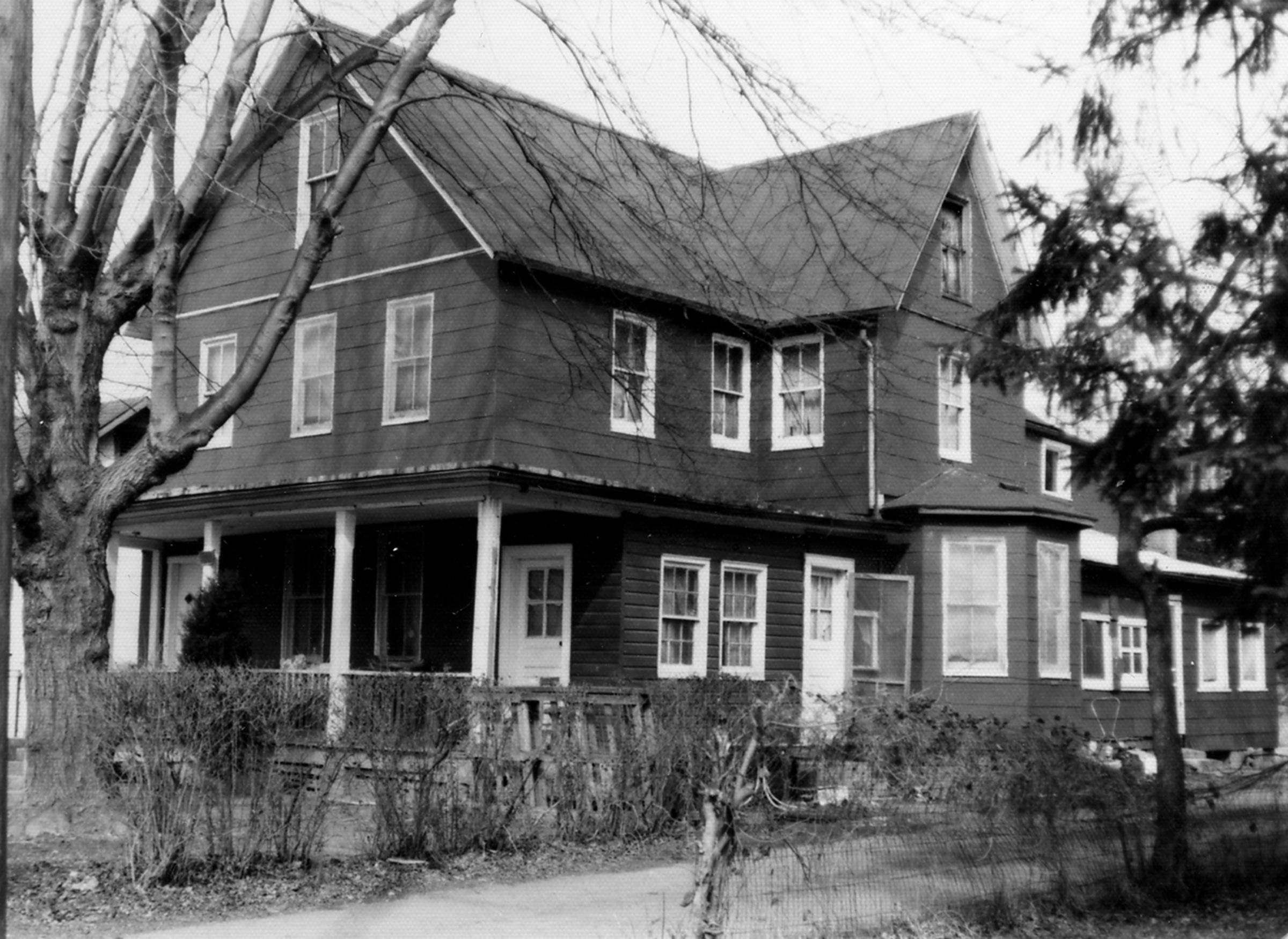
One of Lakeland’s larger houses is pictured above. Located on western Navahoe Street, it was purchased by Richard and Mary Walls in 1925 and used as a rooming house. Property records note this parcel as being a multi-living unit on multiple lots. This part of Lakeland between U.S. Route 1 and Rhode Island Avenue was the most densely populated area and was frequently challenged by flooding. In the early 1960s, community leaders sought help from their city government to solve the flooding problem and to help some residents renovate their homes to meet modern standards.

Section of Weygandt property
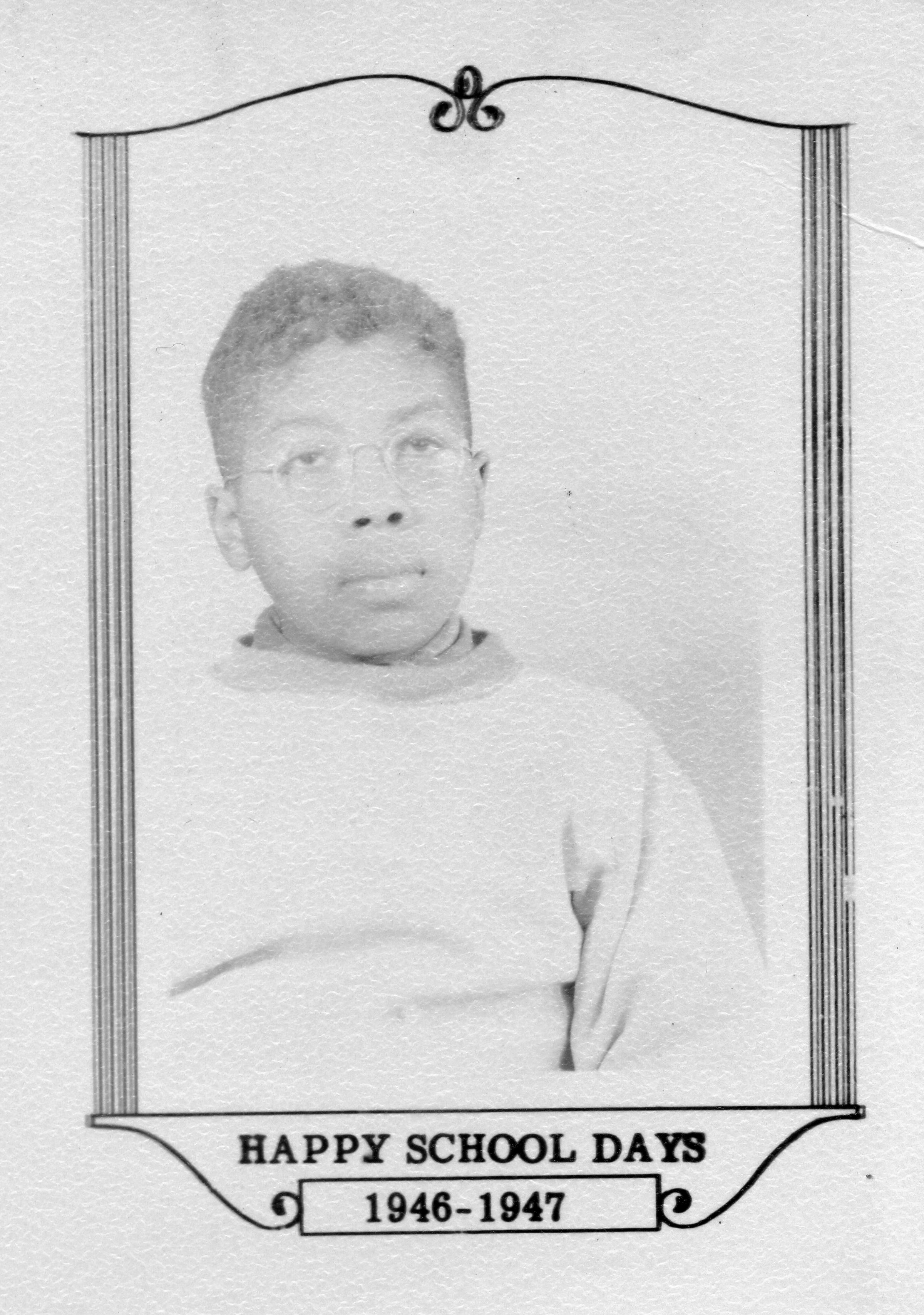
School picture

Cincinnati Avenue Block 44, E. 1/2 of lot 6, parcel 19-7 Joseph A. & Eleanor M. Galvagna

55th Avenue (no #) Block 44 lots 7-11 Leon & Marionette Kelley
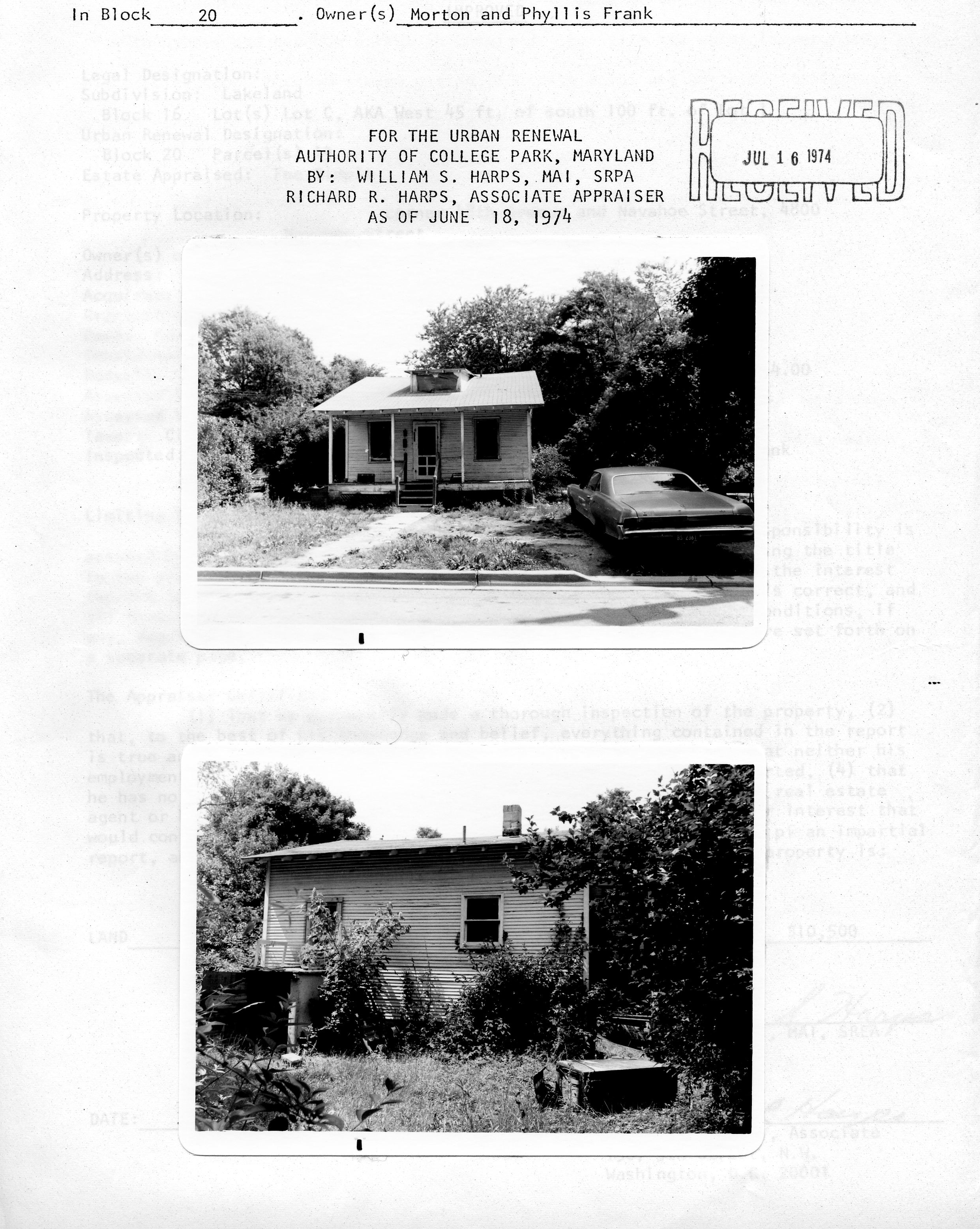
Urban Renewal parcel 20-19 4800 Navahoe Street, Block 16 lot 1 Morton and Phylis G. Frank, c/o Republic Savings and Loan Association
This interview of Dervy Lomax by Neil Cohen is one of two interviews Mr. Lomax has given as part of the Lakeland Community Heritage Project's oral history archive. The interview is broken into two parts: basic biographical data about himself and his family and the impact living in Lakeland has had upon him, personally. Dervy Lomax was born December 20, 1923 in Berwyn. He became a part of the Lakeland community when he came to Lakeland for elementary school. Mr. Lomax recalls the community watching out for his wellbeing, when neighbors told his parents of his misadventures with a well/spring in an empty field on his route to school. Dervy Lomax married a woman named Thelma in 1953 at First Baptist Church in College Park. They remain married at the time of the interview. Mr. Lomax recalls competing for Thelma's hand with a man who would be the best man at Thelma and Dervy's wedding. When she felt he was taking too much time to propose, an aunt pressured him not to be too choosy or to wait too long. The couple has two sons, Gregory Lomax, born March 6, 1954 and Elson Lomax, born November 28, 1956. Mr. Lomax's parents were Etelka Johnson and Charles Lomax, both born in 1902. Etelka was born and lived in Lakeland all her life. Her parents were Blanche and Charles Johnson, of Bladensburg and Lakeland, respectively. Charles Lomax was born in Muirkirk and grew up in Berwyn Heights. His mother was Henrietta Lomax and she and her husband lived in Muirkirk. As a member of the Lakeland Community, Mr. Lomax was involved with the E.L.K.S. and American Legion, as well as being President of the County Boys Club and Serving on the City Boys Club. He is also a long-standing member of the First Baptist Church of College Park. During high school Dervy Lomax was a pitcher on the school baseball team. When he joined the Navy after graduating from high school, Mr. Lomax continued to play. Once he returned to Lakeland, he joined the community baseball team and recalls his time playing as some of the happiest times in the community. He was so talented and loved by the community that he remembers being urged to pitch in games when he was not even scheduled to play. Mr. Lomax remembers some of his most disappointing times as a member of the Lakeland community as being connected to his involvement in local politics. Starting in 1956, just after he returned from the Navy, Mr. Lomax joined Mary (Williams) Holloman in addressing the City Council about the cost of blacktop on Navahoe Street. Mr. Lomax (who was acting as spokesman for Lakeland) was asked if he was a registered voter and, because of his recent service, he was not, so his concerns were not heard by the Council. He ran for Council in 1957 and was elected. During his time serving on the council, Mr. Lomax emphasizes that he demanded respect and gave respect to his peers in return. Despite respecting one another, the Council continued to avoid addressing his concerns through their votes, whenever possible. The proudest accomplishments in Dervy Lomax's life both centered around education of Lakeland youth. First, he played a large part in getting a school in Lakeland after the old school was earmarked as a school for slow learners, a tactic often employed to remove schools for colored children. Committees of black communities were organized along the Route 1 corridor to discuss where the new school should be built, but the school board also held a non-disclosed, whites only meeting in which they decided to build the new school in Berwyn. Because Mr. Lomax was informed of this meeting by his white friends, he was able to address the school board about their misconduct when they held the official meeting in which all communities were present. As a result, the Superintendent of schools agreed that the school should be in Lakeland. Mr. Lomax also appealed to the State Board of Education for integrated schools while his oldest son was entering high school. During the appeal, colored students were being bussed to Fairmont Heights School from College Park, but Gregory was taught by a private tutor, in order to keep his education on track without compromising Mr. Lomax's appeal. The Lomax's won the appeal and Gregory was allowed to choose between Fairmont and College Park High Schools the following year. He attended College Park. The interview continues with Dervy Lomax addressing various influences in his life. He starts by sharing that religion allowed him to successfully work with the public without being negatively influenced by the lack of personal respect that often accompanied his interactions. For example, when Mr. Lomax was successful in petitioning for code enforcement in Lakeland, many of the landlords in Lakeland were unhappy with him. His faith allowed him to grapple with the dilemmas of doing what was best for his community even when members of his community were unhappy with him. Religion also allowed him to overcome the dishonesty he encountered on the City Council. Finally, religion played a role in his ability to deal with Urban Renewal. A further discussion of Urban Renewal in Lakeland will be available in a later interview, according to this recording. Dervy Lomax was also influenced by two important people in his life. Charles Johnson, his grandfather, was a politically oriented person who kept track of current events. Mr. Lomax spent time discussing these events with his grandfather and even listened to the bombing of Pearl Harbor, live on the radio, with Mr. Johnson. From this relationship, Mr. Lomax developed an interest in politics. Mr. Lomax's mother imparted on him the belief that education was important. He attributes his beliefs, "you have to be educated to do something in this world" and "If you don't have nothing up in your head, you don't have nothing in your pocket" to his mother. The subject of Urban Renewal in Lakeland is revisited again, briefly, as being the event to have caused the most significant change in the community. Mr. Lomax expresses disappointment that many families did not return to live in the new houses that were built after Urban Renewal, despite the input they had in the rebuilding process. He also expresses regret that older members of the community are now selling their homes to owners who rent them to college students. Students do not respect the community and the community is deteriorating as a result. The most important events to impact Dervy Lomax's life are his marriage of 54 years and raising his two sons. He wishes his sons would marry and run for office, following in his footsteps. He also wishes for grandchildren. When asked about special childhood memories, Mr. Lomax returns to his memories of sports in the community. During his childhood, Lakeland was divided geographically, into the Southwest, Railroad Bulldogs, and Babyland areas of the community. Teams would form according to these divisions to play all sorts of games (football, baseball, horseshoes, etc). Mr. Lomax also fondly recalls lawn parties being held by local churches and lakes freezing during the winter and being used as skating rinks for the community and the university students. Those same lakes were used for swimming during the summer. At the close of the interview, Dervy Lomax states that he hopes the community will remember him as dedicated to Lakeland and that he will continue to fight for them as long as I have breath in my body".
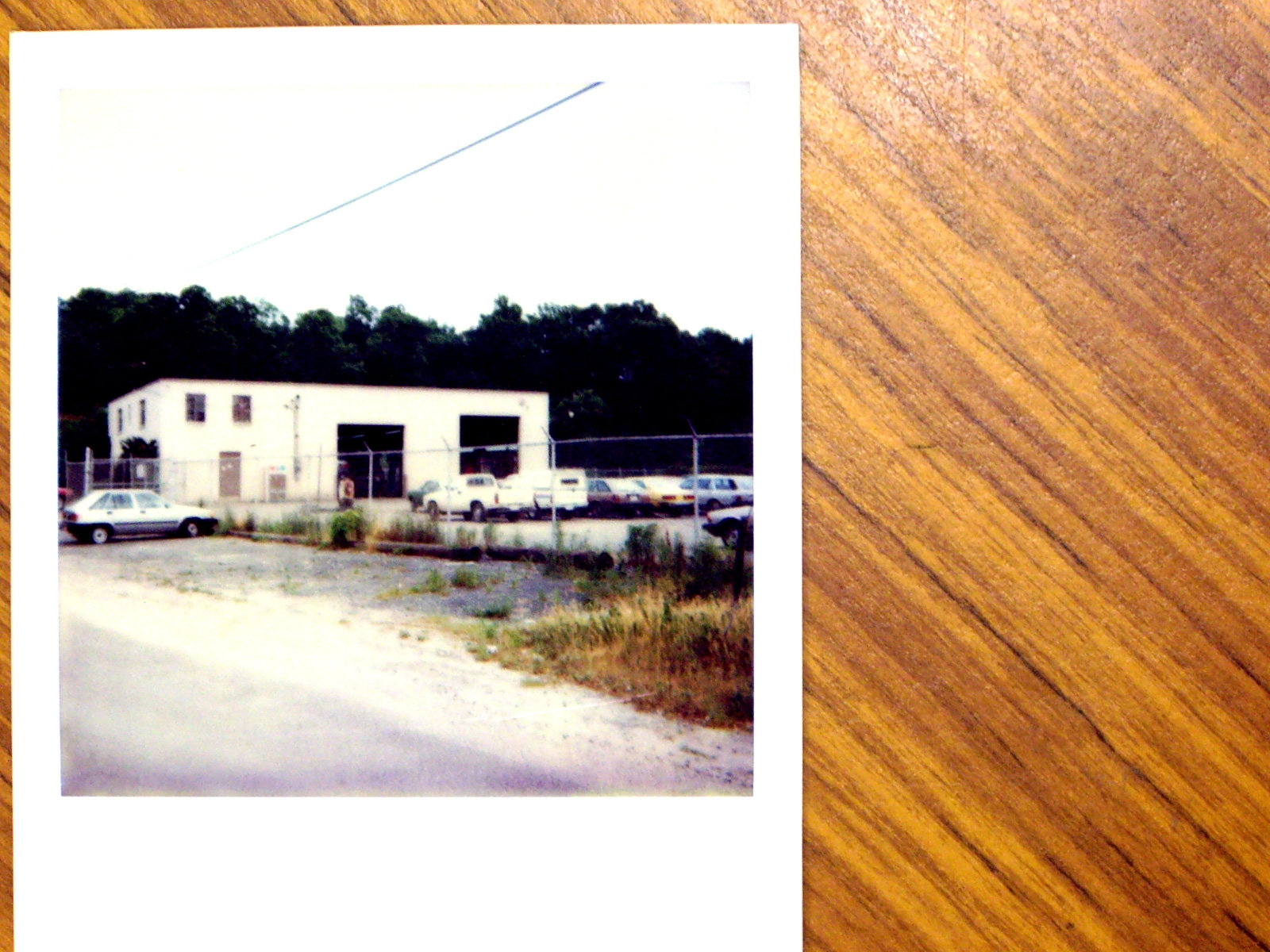
Weygandt property

8011 Winnepeg
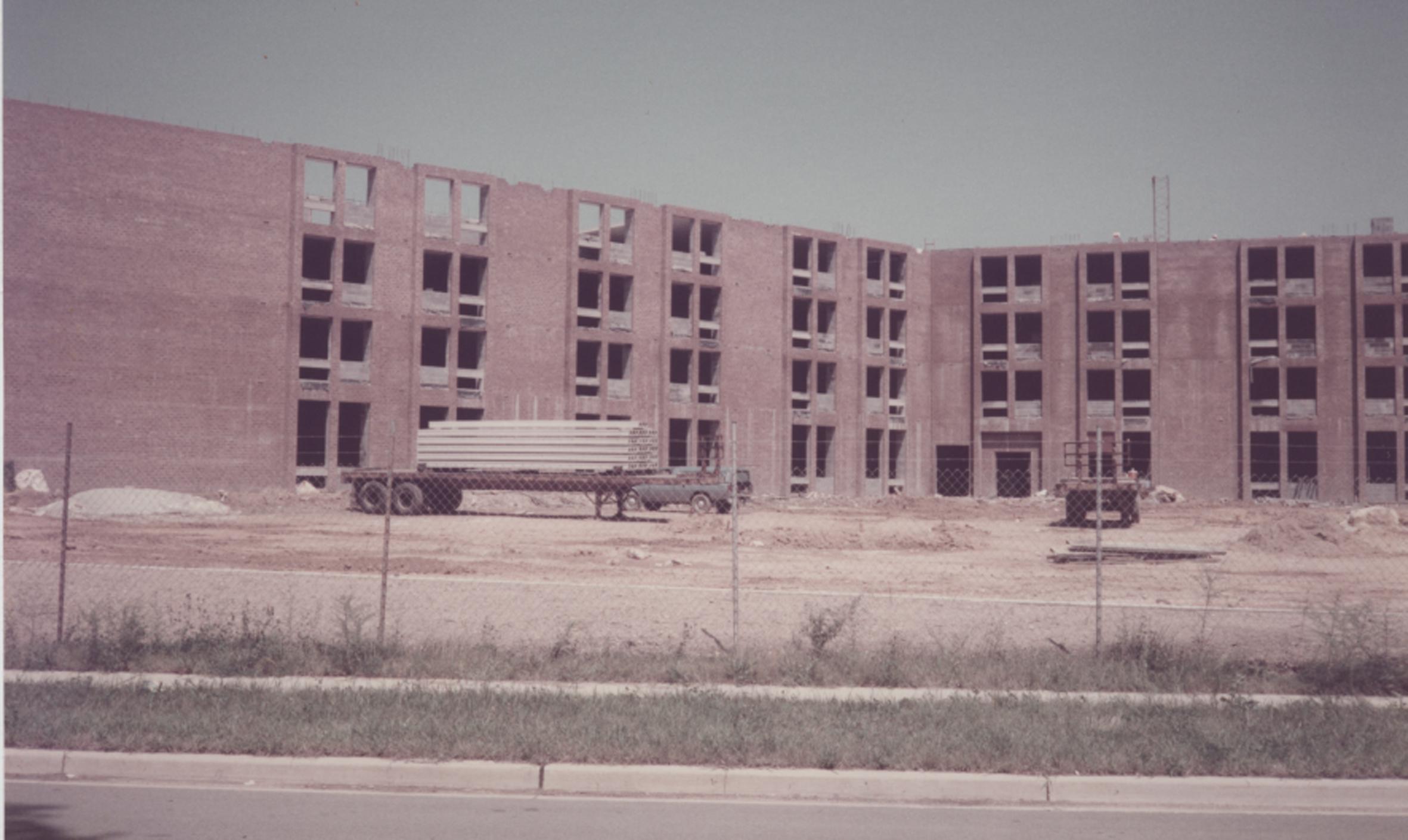
48th Avenue Part of urban renewal redevelopment
Section C: Land Use Plan (cont'd Land Use Provisions and Building Requirements). Regulations, Controls and Restrictions section, cont'd. General Provisions subsection.
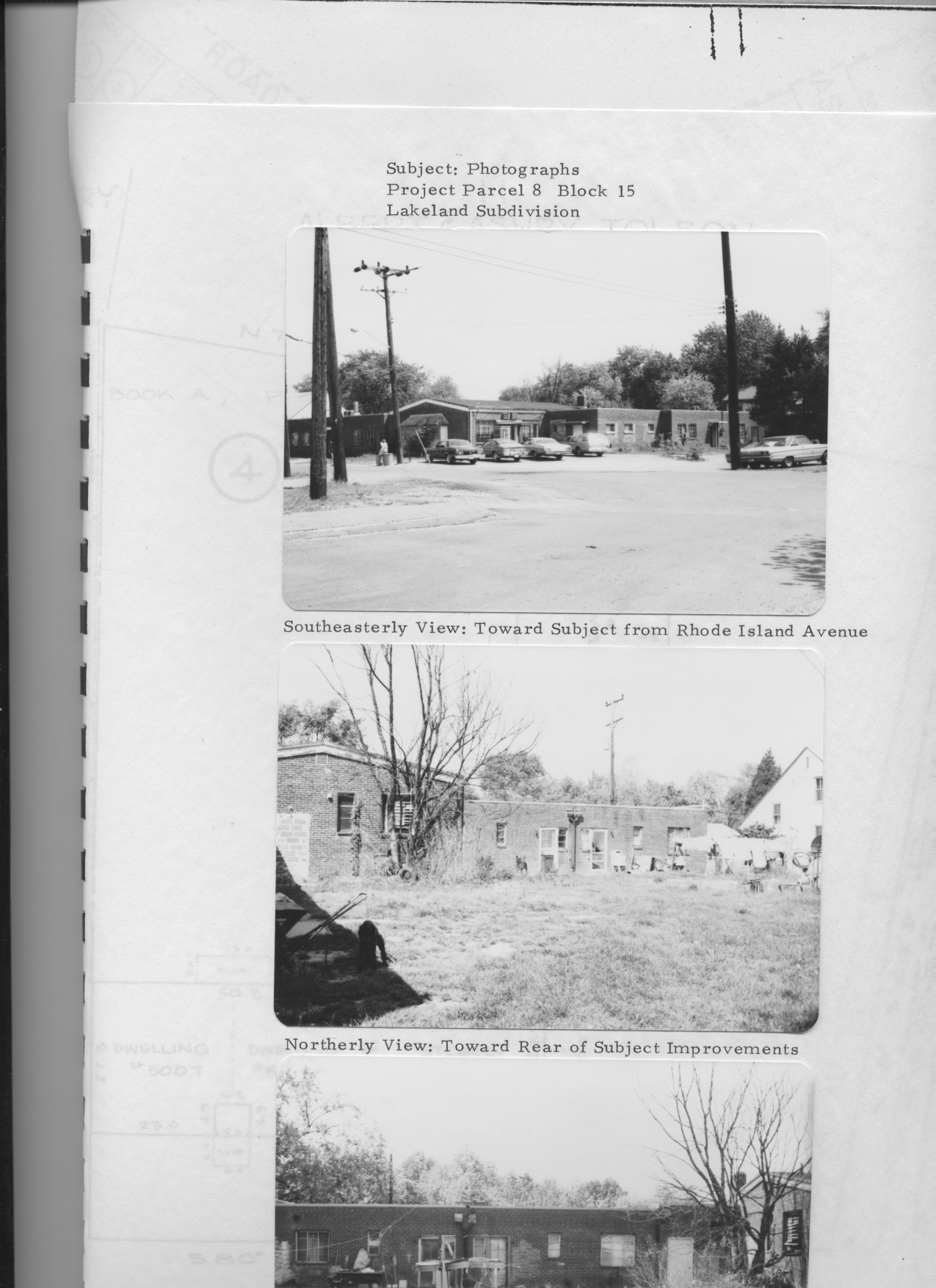
Urban Renewal Parcel 8 Block 15 5001-5007 Lakeland Rd. Notes include "Reports made good living from store. Apt living room, kitchen bath and 1 bedroom. (3) store + 5 apts rent was $68.50 landlord paid water."

5017 Lakeland Rd
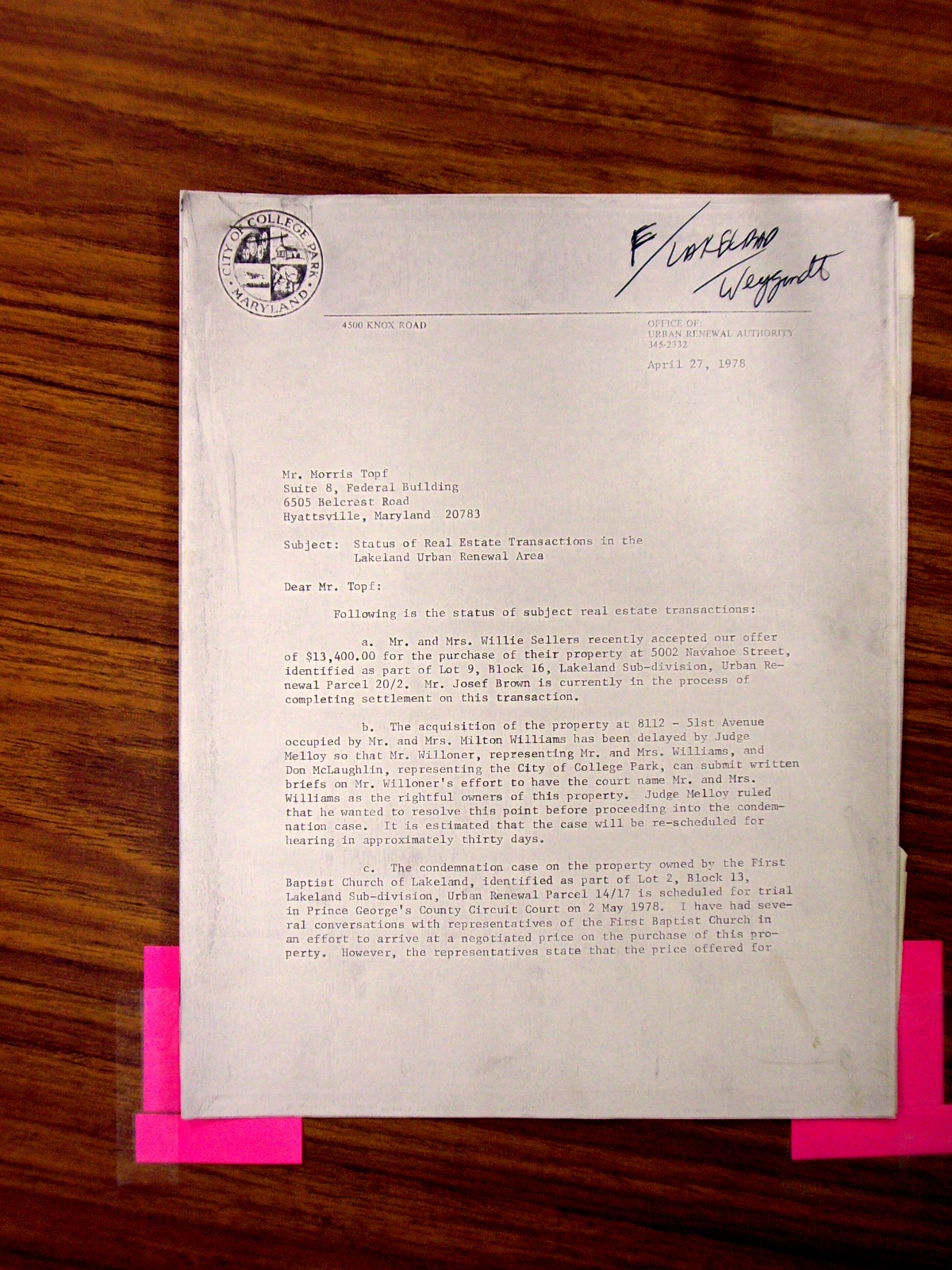
Status of real estate transactions in Lakeland 5002 Navahoe Sellers - Lot 9 Block 16 Williams, 8112 51st Ave, Lot 2 Block 13 First Baptist Church,
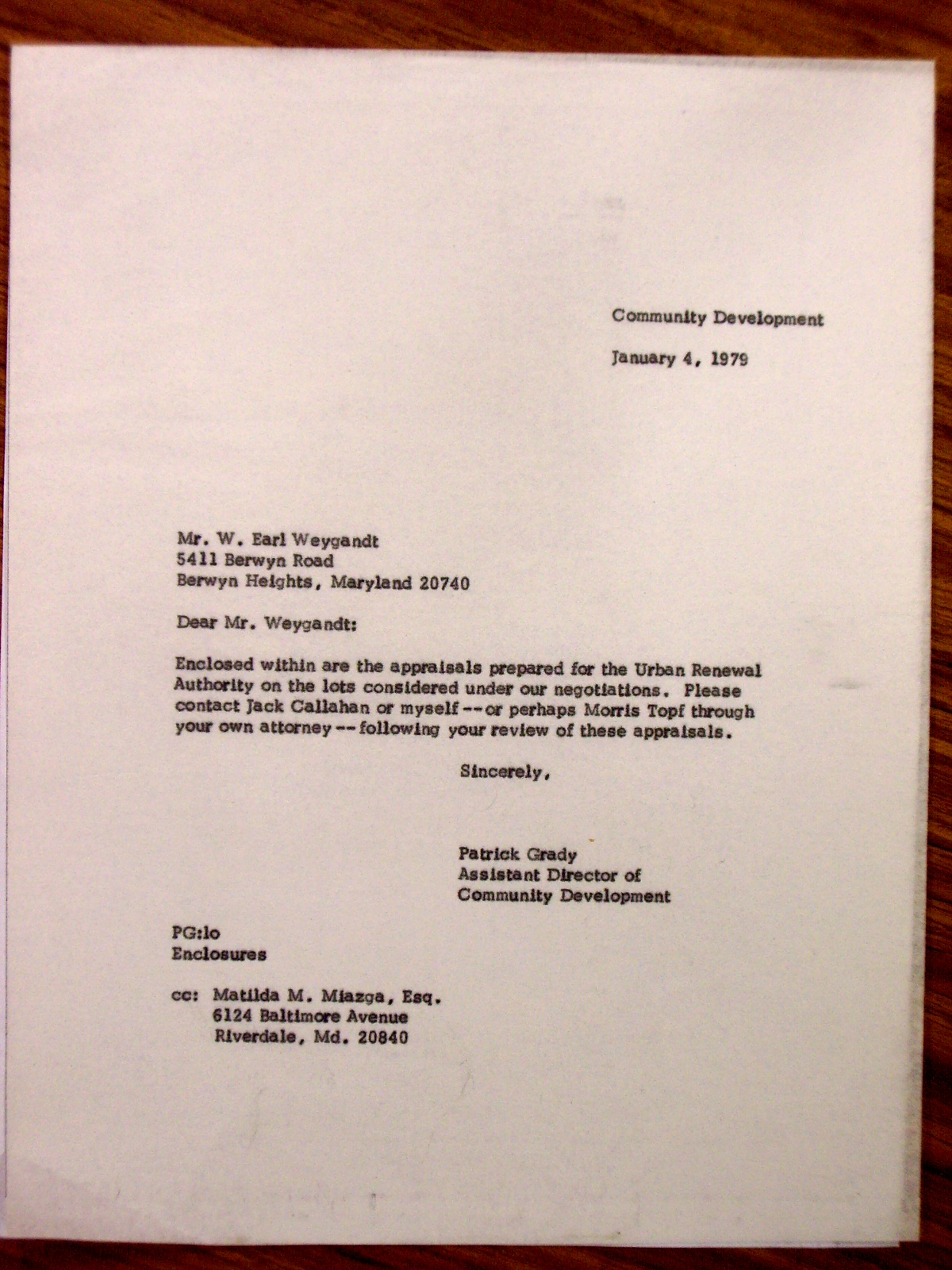
transmitting appraisals
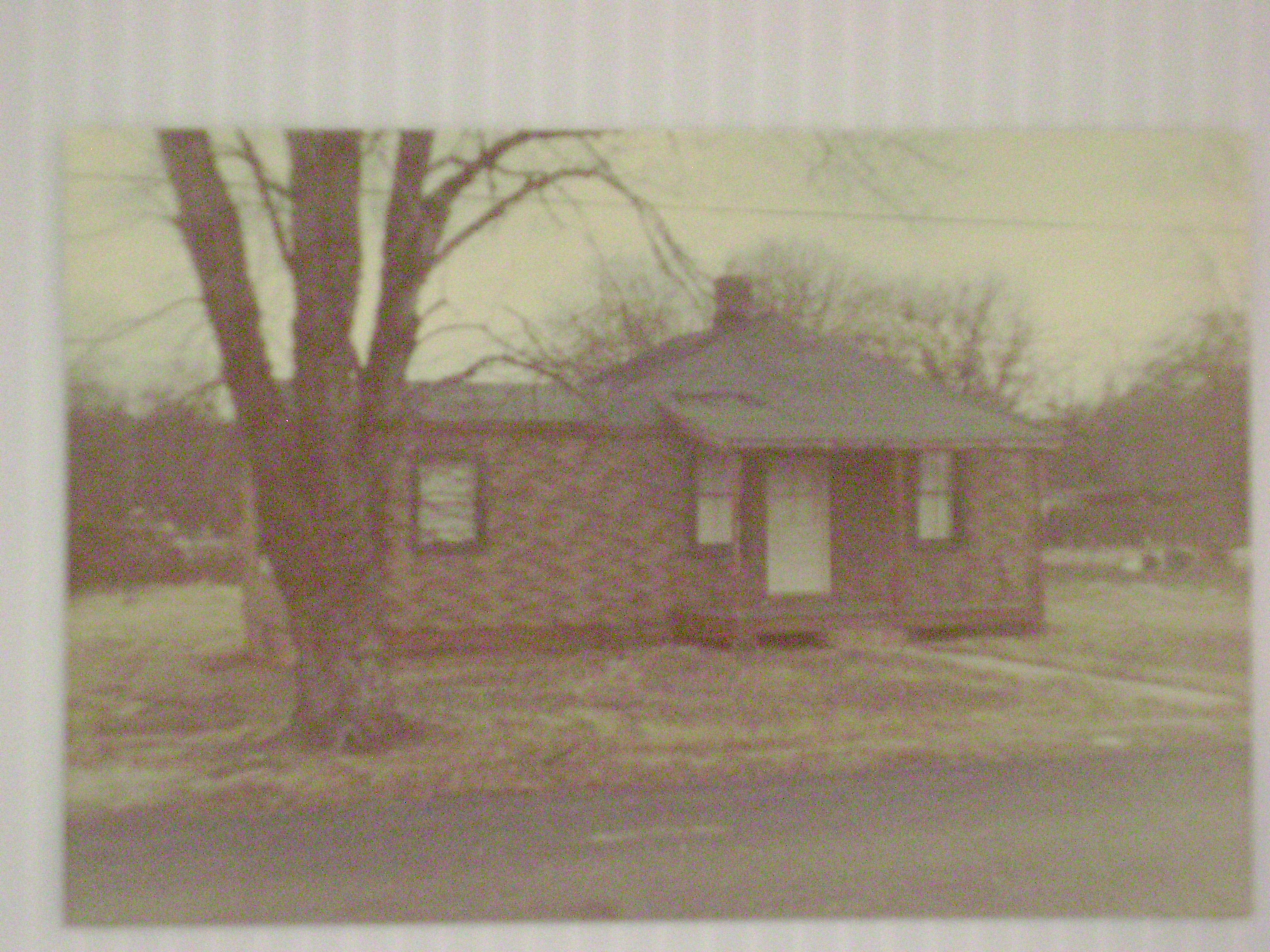
Walter and Mildred Lasick Block 44 Lot 4 8117 54th Avenue Urban Renewal Block Parcel 4
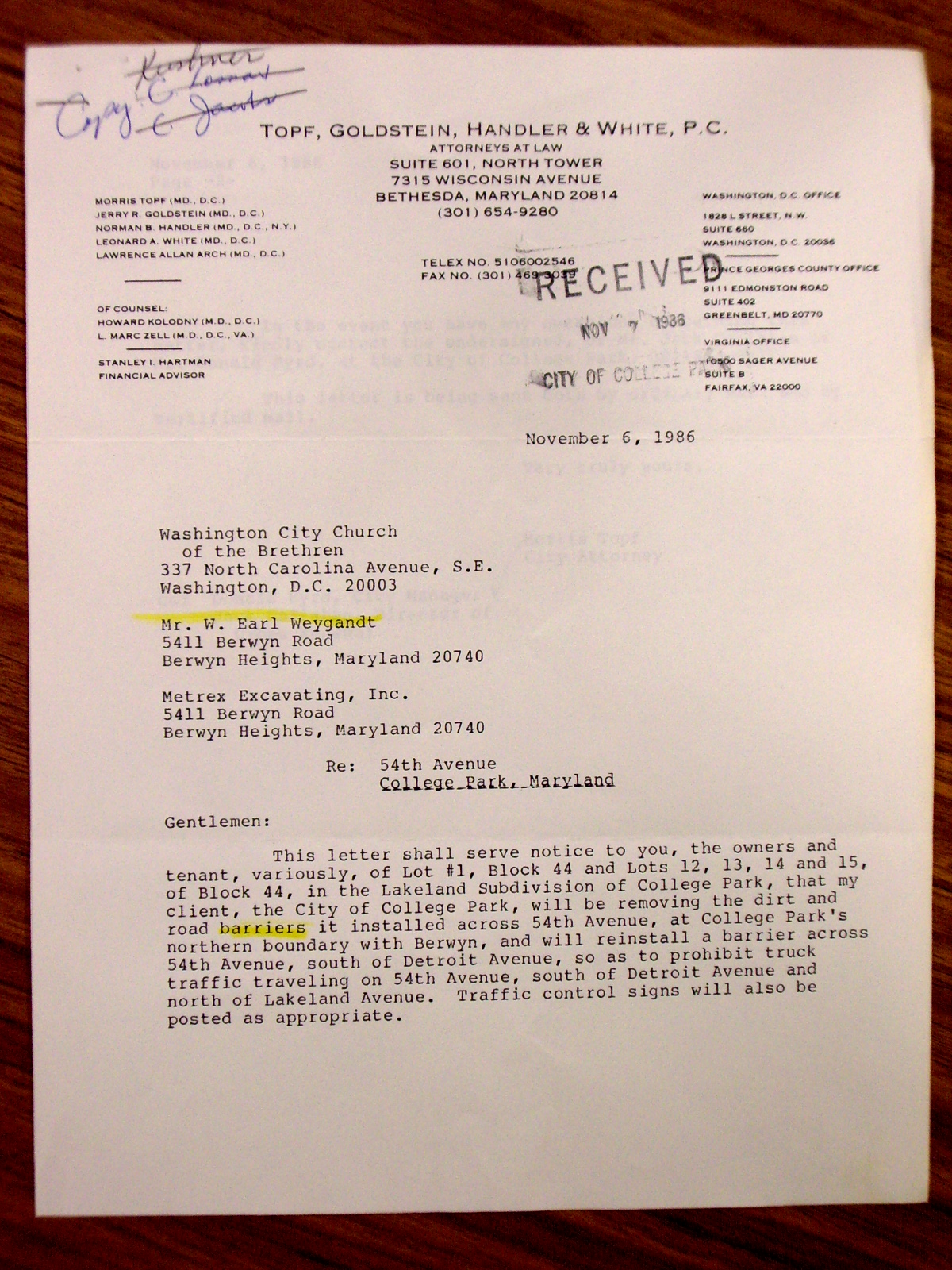
Removing dirt and road barriers and reinstalling barrier at Detroit Avenue 54th Avenue

The Diamondback April 21, 1978 Page 1 Portion of article by Mark Hass Rose Adams lived in Lakeland for more than 50 years. Her son was born in a house built by his grandfather on built on Navahoe Street. In 1972 that house was demolished by the City of College Park. Mrs. Adams has moved to an apartment in Langley Park a 40 minute ride from her job as a custodian on the University campus. The family's Lakeland house was a "family home." were she had lived with her husband and two brothers. One of them died soon after the house was demolished. Adams said "It broke his heart when they tore the house down'" "He had no home, and that's why he died." Mrs. Adams says she still has friends in Lakeland and goes there for church on Sundays. About the project she says "The city sold Lakeland out" "They told us urban renewal would make Lakeland a better place to live. All I see is knocking things down and making people leave." Mrs. Adams was paid $6,000 for her home. That was not enough to buy one of the $50,000 new homes planned to be built.

8115 54th Ave-Dervey A. Lomax
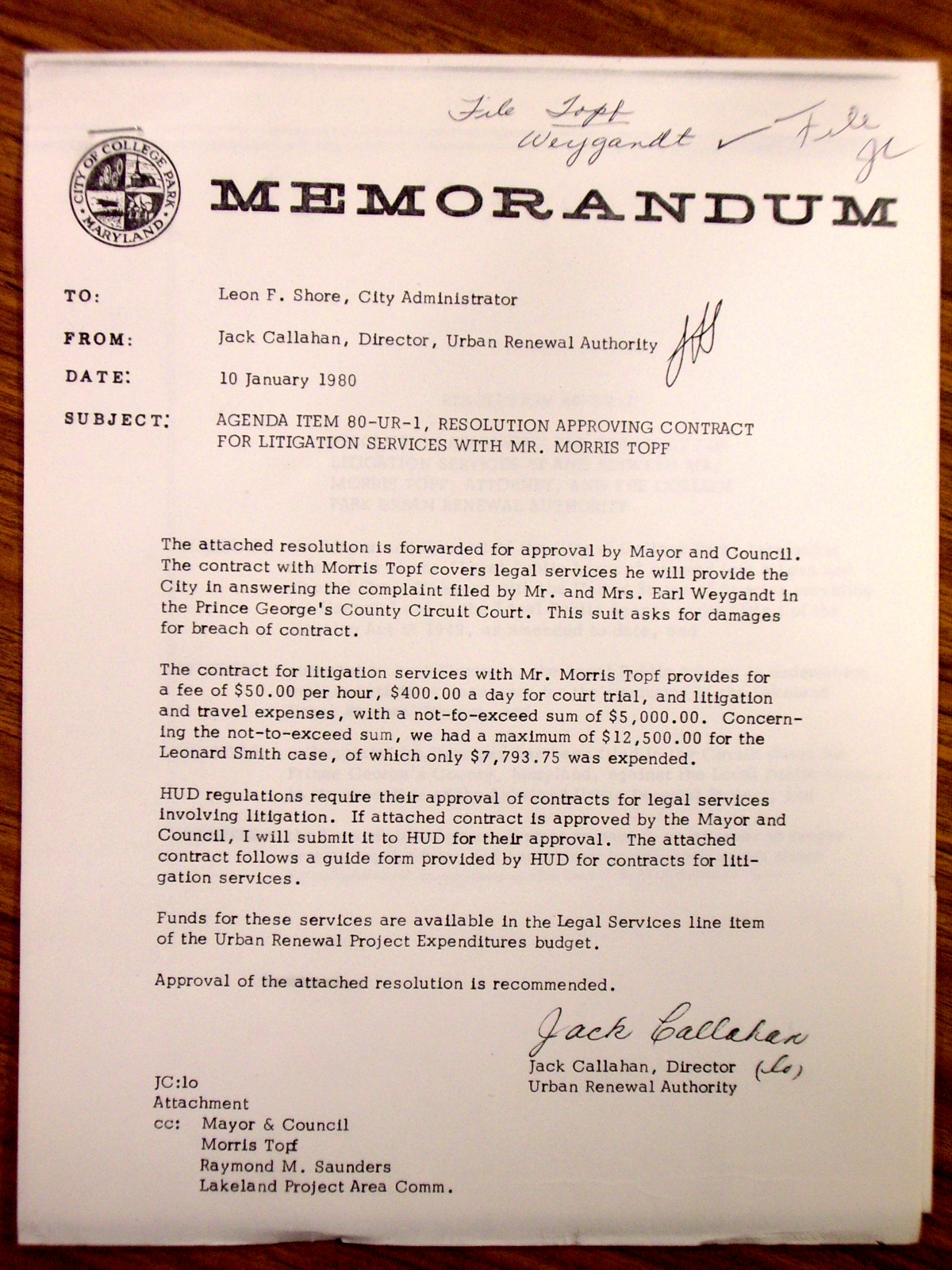
"Agenda item 80-UR-1, Resolution Approving Contract for Litigation Services by and between Morris Topf and the College Park Urban Renewal Authority "
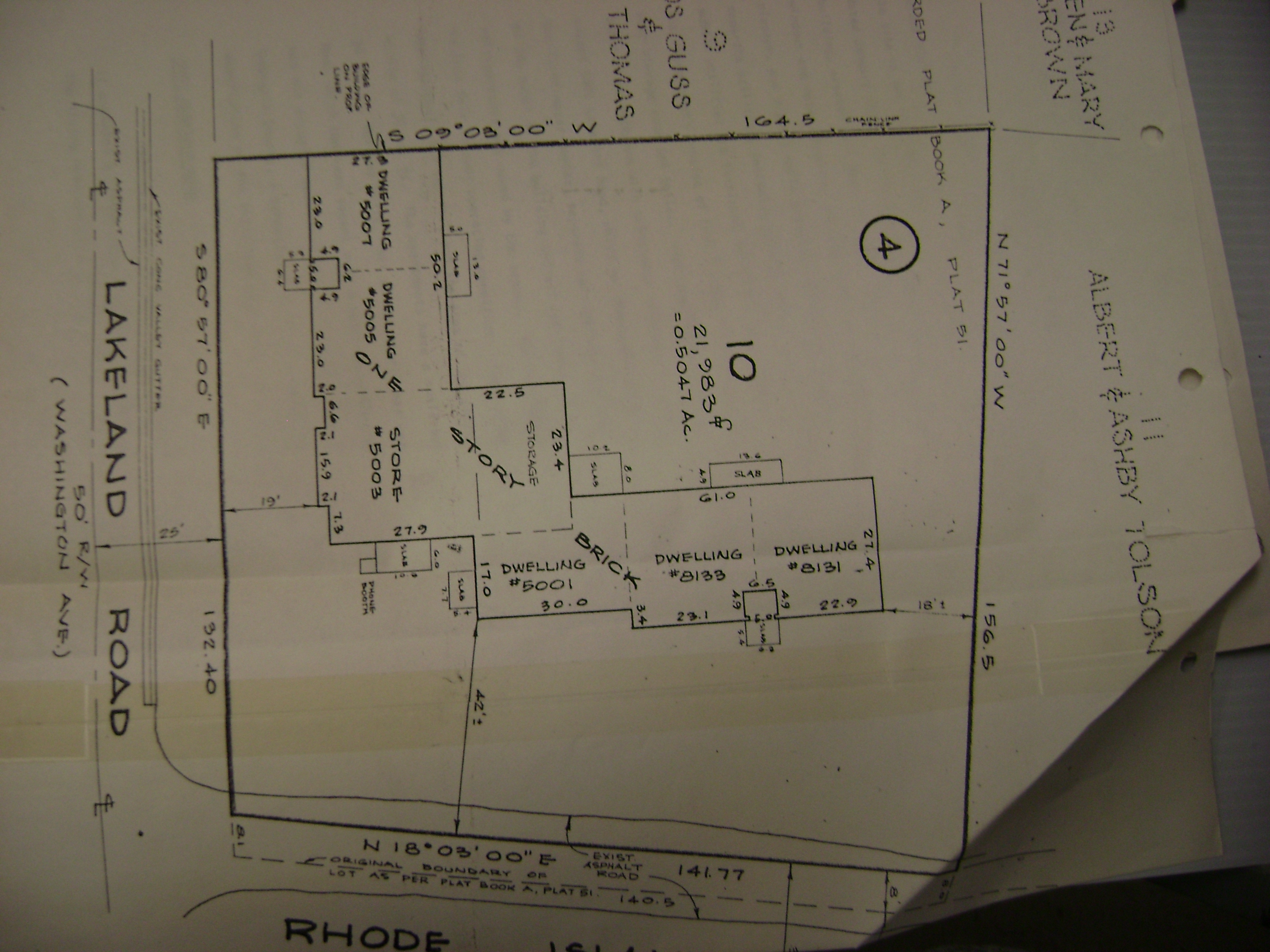
Drawing of building

54th Avenue
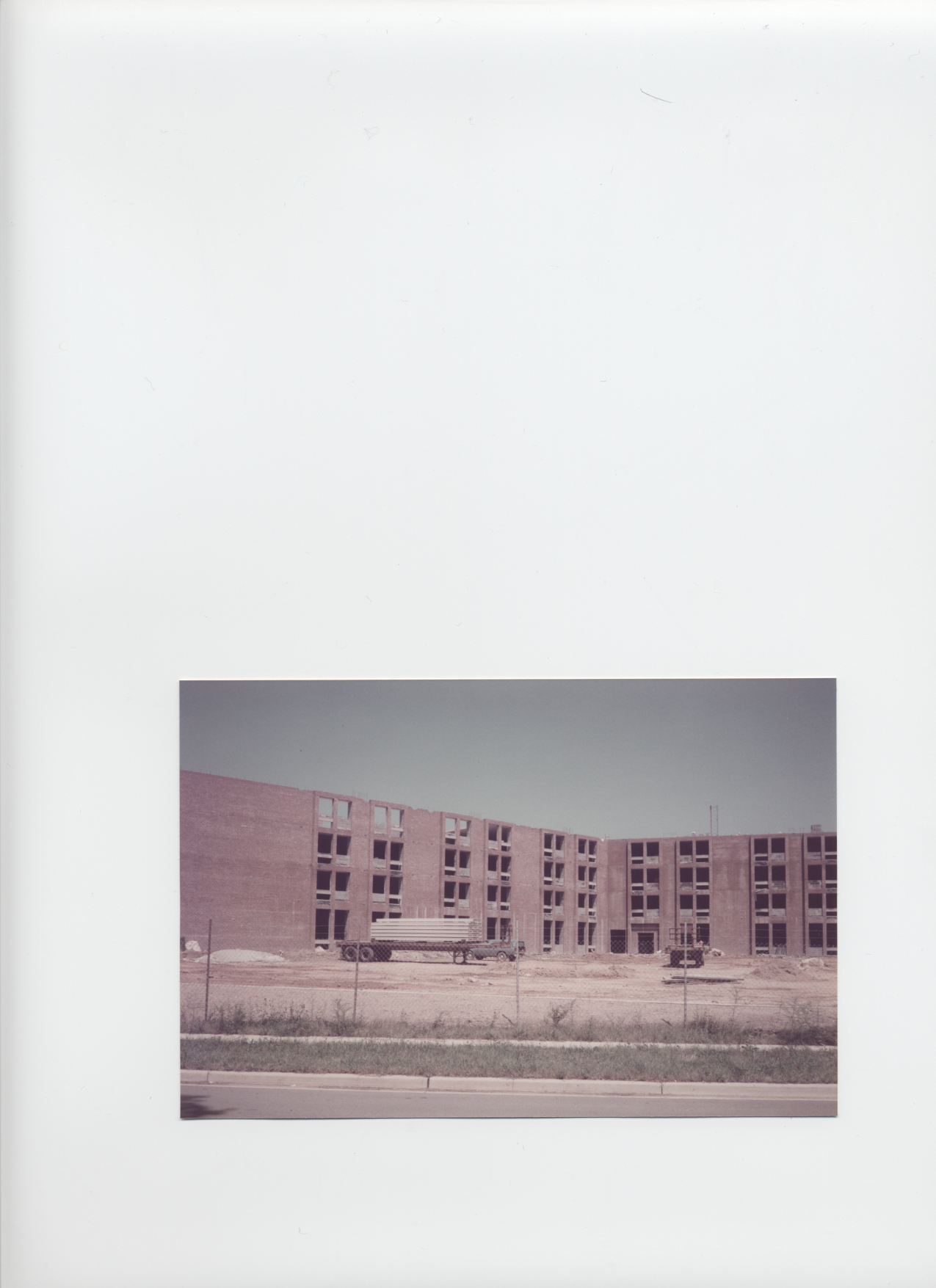
high-rise apartment building
Exhibit "B" Property Rehabilitation Requirements, cont'd. Painting and Decoration - Mechanical Equipment.

owner Telma Fulcher ,Report reads in part" per ap tenent in 33 yrs pays $100 mo as of 1/76" 5017 Lakeland Rd UR Parcel 15-3
A conversation with mother and daughter at their home in Lakeland, on their experiences with education and segregation while living in Lakeland. Themes and Quotes from the interview: "There is value in education and it was never an option to go to college, it was an expectation." Almost like home schooling~ Wilmer Gross "There was special care put into each student at Lakeland elementary school to ensure they had a strong understanding of the basics information needed to be successful in secondary school." "You would work and most likely for the University of Maryland"~ Delphine Gross Lakeland is related through blood, marriage, and church families~ Wilma Gross: Teachers would have their own children in their class, go to church with their students, and know their students extended families. Homecoming was a celebration held by the church and was seen as a family affair where the entire community would get together and reminisce. Students from Lakeland excelled in the classroom post desegregation and for this reason they were occasional the subject of bullying. Changes to the feeling of community after urban renewal. People grow up, getting married, and leave the community because there is limited housing. When outside families move into Lakeland, it is difficult to engage them in community activities.